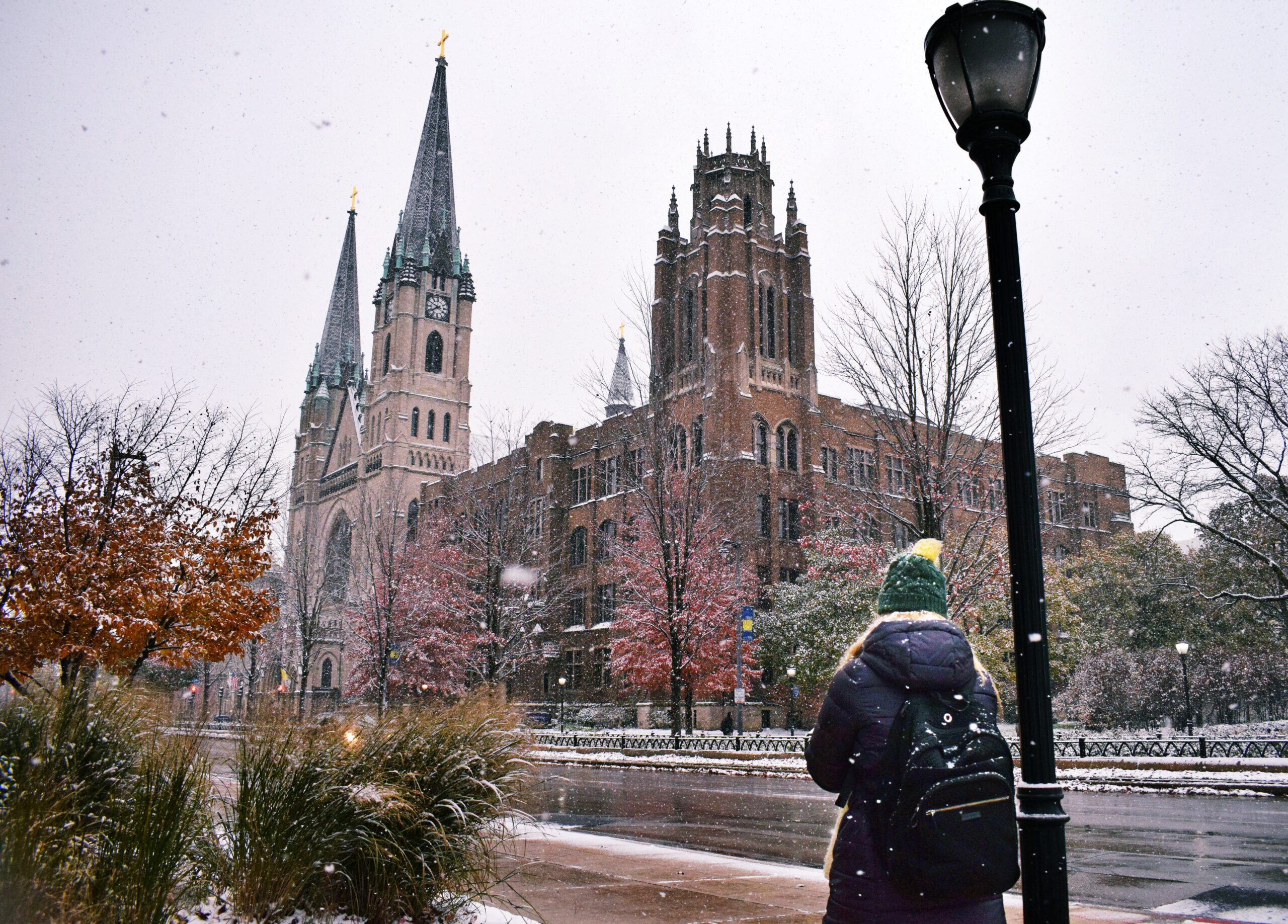
Marquette University’s Office of Research and Sponsored Programs has announced the following grants awarded to university faculty and staff in October and November 2021.
- Marquette engineering professor partners with NSF center for phosphorus sustainability (Dr. Brooke Mayer)
- Marquette nursing professor receives Betty Irene Moore Fellowship for nurse leaders, innovators (Dr. Dora Clayton-Jones)
Libraries Building Data Visualization Capacity in Collaboration with Community Stakeholders
$23,279 – Institute of Museum and Library Services
- Dr. Tara Baillargeon (PI), acting dean of libraries; Elizabeth Wawrzyniak, digital humanities specialist; and Danelle Orange, coordinator of digital scholarship and programs; at Raynor Memorial Libraries
- Abstract: Raynor Memorial Libraries will partner with the Cristo Rey Jesuit High School Work Study program to develop a work-based digital literacy program to address gaps in educational access for high school students that have been exacerbated by COVID-19. The program will help prepare students to transition from high school to college and into the digital work environment.
Exploring Virtual Interventions for African American Caregivers of Older Adults
$14,319 – Bader Philanthropies, Inc.
- Dr. Abiola Keller, assistant professor in the College of Nursing
- Abstract: Researchers will conduct semi-structured interviews with 35 African American women caring for older adults in Milwaukee to explore questions critical for guiding the design and implementation of a virtual intervention. The results will be used to develop a virtual, multi-disciplinary intervention to promote well-being among African American women caring for older adults in Milwaukee.
Milwaukee Neighborhood News Service — Funding for Reporters
$50,000 – Bader Philanthropies, Inc.
- Ron Smith, editor/project director of the Milwaukee Neighborhood News Service in the Diederich College of Communication
- Abstract: This funding will support the salaries of part-time reporters to continue developing a collaborative model for journalism that is embedded in serving readers and allowing them to help set the news agenda.
Those Who Survived Death and Resilience on Mesoamericas Costa del Sur
$35,000 – Newberry Library
- Dr. Laura Matthew, associate professor of history in the Klingler College of Arts and Sciences
- Abstract: “Those Who Survived” reconsiders the intertwined effects of pandemic disease, invasion, enslavement and cultural violence on Indigenous Mesoamericans at the end of the 16th century rather than the better-known Spanish conquest era, by examining networks of commerce, migration and intellectual exchange across one of the most important trade corridors of the Mesoamerican world: the southern Pacific coast from modern-day Oaxaca to El Salvador.
Family Stress During and After NICU Hospitalization: A Feasibility Trial
$2,000 – National Association of Neonatal Nurses
- Dr. Kathryn Malin, assistant professor in the College of Nursing
- Abstract: This prospective longitudinal correlational study will measure the degree of stress experienced (biologic markers) resulting from the interaction between the stressor, perceptions of stress and resources. The purpose is to determine the feasibility and acceptability of collecting both biologic markers and instrument data measuring maternal and infant stress during and after NICU hospitalization. Results from this feasibility study will be used to guide larger NIH funded studies of the reciprocal stress processes in families in the NICU.
Penn State Fellowship
$20,554 – Pennsylvania State University
- Dr. Kimberly Ann Harris, assistant professor of philosophy in the Klingler College of Arts and Sciences
- Abstract: This fellowship supports a book that will argue that W.E.B. Du Bois produces a philosophy worthy of sustained attention by all contemporary philosophers. Although he claimed to have learned a lot from his philosophy professors, he thought academic philosophy was lovely but unproductive. As the tale goes, he turned away from philosophy for more fruitful intellectual pursuits in history and sociology. This is not true. Instead, the book will show how his view of philosophy integrates history and sociology. For him, philosophy is useful in that it promotes social change.
Closing the Breastfeeding Gap: Using Tele-lactation to Provide Equitable Breastfeeding Support to African American Women
$50,000 – The Rita and Alex Hillman Foundation
- Dr. Karen Robinson, assistant professor in the College of Nursing
- Abstract: This project will combine community-based peer breastfeeding support and access to a primary advanced practice provider to utilize tele-lactation support throughout the perinatal period with hopes of improving breastfeeding rates for African American women. This innovative delivery of service may also bring equitable lactational support to a population often dismissed due to stereotypes related African American women and breastfeeding.
Dynamic Temporal and Tactile Cueing (DTTC) with “Masking”: Single Case Experimental Design (SCED) Study
$150,000 – Once Upon a Time Foundation
- Dr. Jenya Iuzzini-Seigel, assistant professor of speech pathology and audiology in the Klingler College of Arts and Sciences
- Abstract: This study will explore the efficacy of Dynamic Temporal and Tactile Cueing Treatment for children with childhood apraxia of speech when child and clinician are masked to abide by safety protocols due to COVID. This is an important question regarding whether this speech treatment can be delivered to maximum effect while incorporating current safety protocols designed to minimize COVID transmission in clinical settings.
Development of Selective Cu-Catalyzed Alkene and Alkyne Functionalization Reactions
$110,000 – Petroleum Research Fund
- Dr. Joseph Clark, assistant professor of chemistry in the Klingler College of Arts and Sciences
- Abstract: This project will involve studying the selective deuteration of petroleum-derived alkenes and alkynes in order to develop an enantioselective hydrofluorination of aryl alkenes. Beyond gaining insight into the fundamental reactivity of petroleum-derived compounds, new functionalization methods will be developed to make value-added deuterated and fluorinated compounds from alkene and alkyne containing petrochemical derivatives.
Emerging from COVID-19: Involvement in Campus Activities and Young People’s Success, Sense of Belonging, Health, and Well-being
$1,250 – National Association for Campus Activities
- Dr. Erin Hoekstra (PI), assistant professor of social and cultural sciences in the Klingler College of Arts and Sciences; Dr. Gabriel Velez, assistant professor, and Dr. Jody Jessup-Anger, chair and professor, both of educational policy and leadership in the College of Education; and Dr. Samuel Nemanich, assistant professor of physical therapy in the College of Health Sciences
- Abstract: This award will go towards developing understandings about how experiences of the pandemic are shaping the transition to college for first-year students. Through a mixed method, longitudinal research design, this study specifically analyzes the role of involvement in campus activities in mediating some of the negative impact of the pandemic on first-year students’ success, sense of belonging, and health and well-being. It will provide valuable insight into needs and challenges of this, and following, cohorts as they enter college, and it will inform rich understandings of the developmental impacts of the pandemic as experienced during a key time in the life course for educational trajectories and the role of involvement in campus activities in mediating the negative impacts of the pandemic.
COVID-19: Between Historical Inequalities and Future Challenges
$5,000 – Wisconsin Humanities Council
- Dr. Andrew Kim, associate professor of theology in the Klingler College of Arts and Sciences; and Jorge Montiel, graduate assistant in the Center for the Advancement of the Humanities.
- Abstract: “COVID-19: Between Historical Inequalities and Future Challenges” is a series of panels that bring together faculty and community leaders to discuss the ethical injustices marginalized communities face during the pandemic and their future challenges.



